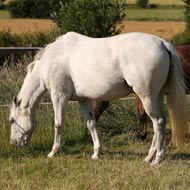
Nearly a quarter of horses and ponies in the UK are overweight or obese, according to the recent National Equine Health Survey (NEHS).
Obesity is up by 37 per cent compared to figures from last year's survey, but researchers say this could be down to increased recognition of the problem.
Owner awareness and understanding is also on the rise, with more horse keepers using weight management methods.
NEHS is an annual snapshot survey run by the Blue Cross, in partnership with the British Equine Veterinary Association.
This year, 23.2 per cent of horses were assessed as being overweight, with a score of 3.5 to 5 on the 0-5 scale.
Despite this, 96 per cent of owners said they had changed their management method in a bid to control weight.
Preferred methods were:
- Reducing hard feed - used by 20 per cent of owners
- Strip grazing - 15 per cent
- Soaking hay - 13 per cent
- Reducing turn out time - 12 per cent
- Grazing in a bare paddock - 11 per cent
- Reducing forage - 9 per cent
- Changing hard feed - 6 per cent
- Using a grazing muzzle - 5 per cent
The percentage of owners using a weigh tape to assess their animal's weight has also risen significantly - about two-thirds of participants in this year's survey, compared to 51 per cent in 2014.
Clare Barfoot, research and development manager for feed company SPILLERS, said: "While it's alarming that this year's data shows a rise in obesity we hope that it might simply be the result of increased recognition of the problem.
"It's particularly encouraging to see a higher number of people using weigh tapes, which hopefully reflects increasing awareness of the importance of assessing condition, as a direct result of education campaigns."
Image courtesy of SPILLERS



 Zoetis has launched a new survey to identify management techniques for Equine Herpes Virus (EHV).
Zoetis has launched a new survey to identify management techniques for Equine Herpes Virus (EHV).